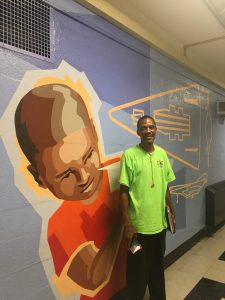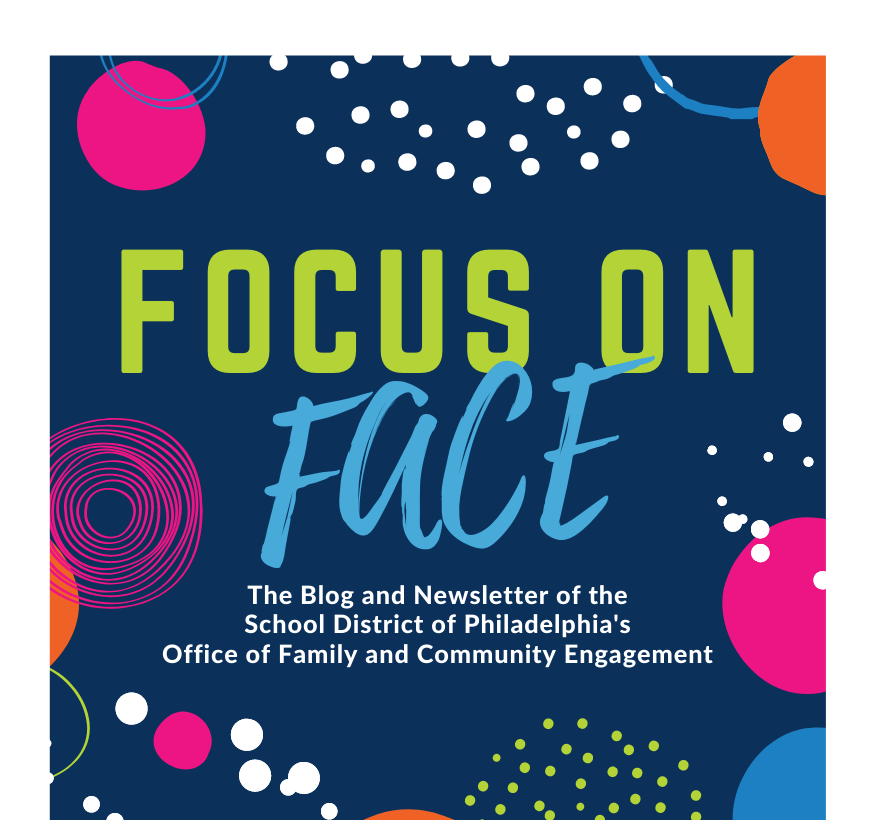When Andrew McKnight walks down the hallways of William Dick School in North Philadelphia, nearly every person he passes knows who he is, grins, and gives a warm greeting. He chats informally about what’s going on with them, how their day is going, or when the next School Advisory Council (SAC) meeting is. Mr. McKnight is not the principal at William Dick, or a teacher, or even part of the non-teaching staff. He is something quite extraordinary: a volunteer who spends most of his free time at the school.
 Mr. McKnight is a native of West Philadelphia but has lived in North Philadelphia for almost ten years. He is a father of three daughters, the patriarch of his extended family, and an avid reader and writer. He always knew of William Dick School, but he became more aware of the school four years ago when his grandson started kindergarten.
Mr. McKnight is a native of West Philadelphia but has lived in North Philadelphia for almost ten years. He is a father of three daughters, the patriarch of his extended family, and an avid reader and writer. He always knew of William Dick School, but he became more aware of the school four years ago when his grandson started kindergarten.
Last year, when his twin granddaughters started at the school, his involvement took on a whole new form. Dorian Harris, William Dick’s Family Engagement Liaison and Mr. McKnight’s mentor, held a meeting to drum up interest in forming a School Advisory Council. Mr. Harris invited him to get more men involved in the school, and Mr. McKnight took him up on it.
“I came to the meeting,” Mr. McKnight remembers. “It was in the auditorium, and it was a bunch of women and me.”
Next thing he knew, he was being nominated to serve as the SAC Facilitator, the person who writes the agendas, drives the conversation, and mediates conflict on the SAC. From there, “everything just started to snowball. I remember the beginning and I remember today, but all the stuff in the middle is a blur because I’ve been doing so much!”
His success as a volunteer seems to come with his endless drive to get people involved. “People didn’t want to be bothered with the school last year,” Mr. McKnight explains. “People weren’t coming to meetings, and there was no Home and School. People would drop their kids off and leave and didn’t speak to the teachers.”
Mr. McKnight has made it his mission to change this. He takes advantage of his part-time job cutting grass to get to know more people in the neighborhood and invite them to get involved in the school. He’ll chat with parents when walking down the street about their child’s progress or problems they’re having, and he even knocks on doors to distribute flyers for upcoming SAC meetings.
Although volunteer attendance can be spotty and maintaining involvement can be difficult, he is not giving up. He knows it can be hard to find time and people can find almost every excuse not to volunteer. “I went through the same thing,” he admits. “But you have to remember: it’s not about you. It’s about your child. And what other way to make sure that your child and the next child and the next child get the proper education and things are going well in the school than to come and volunteer?”
When asked about what he considers to be the SAC’s greatest accomplishments in the past year, Mr. McKnight names a couple of things. The first is the growth in attendance, going from six people showing up to the first meeting last school year to sixty attending the last. Another is “Donuts for Dads”, where 25 men attended workshops, had conversations about parenthood, and heard their children talk about how important and loved they are. This is a subject clearly close to Mr. McKnight’s heart; he hopes to get more and more fathers to participate in the school.
Mr. McKnight is not settling for the progress his SAC made last year – he believes that even the best schools have room for improvement and can always use more help. He is excited about an open house event coming up later in the fall that will allow parents and family members to come in and chat with teachers and build positive relationships. He’s also thinking about ways to help young single mothers obtain their GED. He is truly a fountain of ideas and passion for the school.
And his ultimate goal for William Dick School?
“I want it to be a happier place, I want to see it brightened up,” he says simply—though, like anything that requires volunteer support and community buy-in, this is no simple task. “My goal for this school is to make is so community friendly, surveys are being done, and academic scores are getting higher…I want this to be the jewel of Diamond Street, and it’s possible, I see it every day when I walk in the school.”

